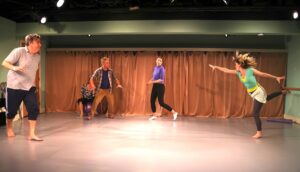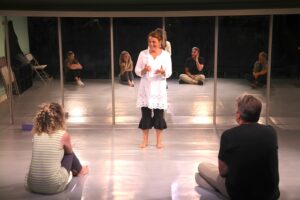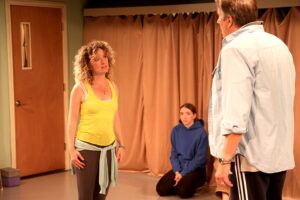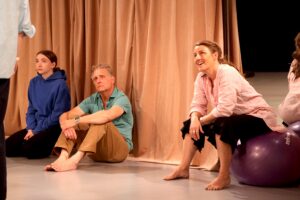Theater professionals have always loved, hated, and obsessed about acting classes. The old-fashioned schooling of British academies emphasizes physical training: voice, accent, projection, movement. An actor constructs a character from the outside in. The American postwar “method” acting revolution, based on the teachings of Stanislavski and the Moscow Art Theatre, emphasizes the deep-rooted emotional connection of actor to character — a persona onstage is created from the inside out. In either case, establishing the link between actor and character, as well as actor and audience, is at the core of the theatrical experience.

Playwright Annie Baker, a Pulitzer Prize winner and MacArthur “genius” grant honoree, likes to view this process on a grassroots level. Her 2009 play, Circle Mirror Transformation, looks at a small drama class held in a Vermont community center over six weeks, in which one of the four students is the teacher’s husband, a local professor. Another student is a local carpenter, and yet another is a local teenager hoping to learn a professional skill. The play opened off-Broadway in New York City at Playwrights Horizons and went on to win an Obie Award and critical praise. Now it has arrived in Wellfleet, at the Harbor Stage, an actor-managed company with an intimate, engaged approach to performance and the community. It’s a glove fit.

The director of this production is Jonathan Fielding, one of the Harbor Stage’s four founders, and the result is an immersive experience in organic storytelling: you learn about the five characters gradually, in bits and pieces, during actors’ exercises and side conversations, in their own words and from others’ points of view. It’s not always clear what is speculative and what is true. Baker, as a playwright, is known for her long silences and unrushed pacing, and Fielding builds on that. The first act is at times perplexing, at times frustrating, and the narrative is sketchy at best. The actors’ exercises are only occasionally revelatory and sometimes seem aimless. The teenage student in the class, Lauren, played pitch-perfectly by Jackie Scholl, recognizes this and openly complains about it, expressing the skepticism that some in the audience undoubtedly feel.
But patience is rewarded. As more and more is revealed, a relatively distinct picture emerges of what has been going on behind the scenes. The drama that unfolds in the second act (the play runs two hours and 10 minutes with a 15-minute intermission) is fuller, richer, and more nuanced. It’s still a house of mirrors — literally, with a backdrop wall of mirrors eventually undraped, revealing the audience — but so, too, one has to admit, is real life.

Because the process of discovery is such an integral part of the play, encapsulating the story of Circle Mirror Transformation would be something of a spoiler, and I’ll refrain. The cast, however, deserves a proper introduction. As Marty, the class’s teacher, D’Arcy Derham brings a marvelous gravitas to the role. She’s unfailingly supportive, with the sometimes maddening approach of a group therapy facilitator. But when cracks appear in that facade, and the emotional torment that lies within is exposed, it’s thoroughly convincing.
Robert Kropf, like Fielding a founding member of the Harbor Stage and also its artistic director, plays Schultz, the carpenter. He’s a sheepish man, a sad sack, and Kropf is moving in the part — his moments of insight and flickers of joy are heartfelt. Robin Bloodworth, a seasoned Harbor Stage vet, takes on the complicated role of James, Marty’s professor husband, with aplomb. And Winslow Corbett, as the enthusiastic yet shallow Theresa, the only one in the class besides Marty who has acting experience, gives her delivery a seductive jolt of energy.

Mind you, most of these folks are not particularly likable. They can be pathetic, ill-advised, thoughtless, and/or irritating. The exception is Jackie Scholl’s Lauren, whose alienated teenage glumness takes a wonderful turn at the end of the play in a speech that makes the entire theatrical experience whole. Her “transformation,” per the title, is most complete.
Scenic designer Justin Lahue and lighting designer John R. Malinowski do a superb job of keeping the mostly bare stage focused and confining, from bright to dim, opaque to probing.
Baker’s play is hardly August escapism, and it’s a bold choice for the Harbor Stage. But that’s one of the company’s strengths, and thanks to Fielding and his superlative ensemble of performers, a protracted actors’ exercise becomes a mirror to our souls.
Acting Out
The event: Circle Mirror Transformation, a play by Annie Baker
The time: Through Aug. 31, Wednesday through Saturday at 7 p.m.; Sunday at 5 p.m.
The place: Harbor Stage Company, 15 Kendrick Ave., Wellfleet
The cost: $28.22 including fees (also $43.82 and $54.22, with added donation); Friday, Aug. 15: pay what you can



